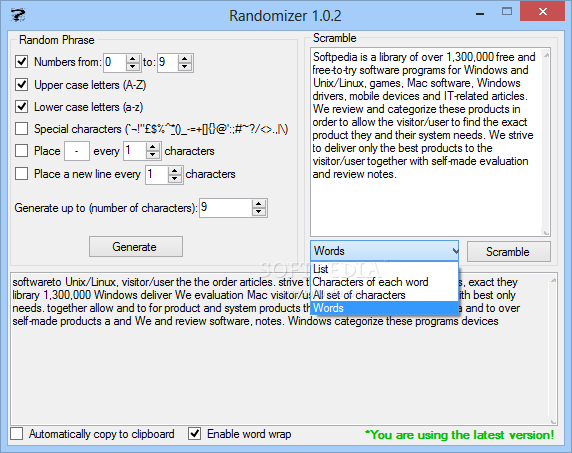Error Generating A Key For Authentication Pass Phrase
- Error Generating A Key (ku) From The Supplied Authentication Pass Phrase
- Snmpwalk Error Generating A Key (ku) From The Supplied Authentication Pass Phrase
- Error Generating A Key For Authentication Passphrase Change
- Error Generating A Key For Authentication Passphrase Mac
- Error Generating A Key For Authentication Passphrase Windows 10
Generating the key using the command you. SSH Public-Key Authentication Failure. Nessus failed to load the SSH private key. Is the associated passphrase correct? Adding a pass phrase to my private key solved my problem. I used the following command to add the passphrase: ssh-keygen -p -f mykey.key Before I could run that command successfully, I needed to change the permissions on the key file. 777 is not restrictive enough, and ssh-keygen would not touch it.
The game brings the engine TrackMania 2 stadium locations known for extremely popular TrackMania Nations Forever. The prototype became a favorite of millions of people, so developers did not take the risk of introducing some dramatic changes and instead confined mainly to the amendments. TrackMania 2: Stadium gets too use all the features ManiaPlanet so the fans were given access to the latest social features and extensive map editor allows import new 3D objects. Trackmania 2 canyon pc download. Among them was a much better graphic design, which offers a higher level of detail and sophisticated lighting effects.
Openssl generate key from csr. Using SHA-2 algorithm to generate the self-signed certificate By default, the openssl command uses the SHA-1 algorithm to generate the self-signed certificate on the PCA. Optionally, you can use SHA-2 for the digital signature hash by adding the -sha256 option, as in the following command.
Hi,I just set up a new OpenVPN server and having trouble connecting to it. See a log file attached to this
Error Generating A Key (ku) From The Supplied Authentication Pass Phrase
Generated entire credential pairs for server & clients on two different machines the error is still persistent.Snmpwalk Error Generating A Key (ku) From The Supplied Authentication Pass Phrase
Error Generating A Key For Authentication Passphrase Change
Credentials are generated using the following command:Code: Select all
Error Generating A Key For Authentication Passphrase Mac
It would be grateful if anyone can help me out.
remote example.net 1194
client
remote-cert-tls server
dev tun0
proto udp
resolv-retry infinite
nobind
auth-nocache
persist-tun
float
<ca>
[Security-related line(s) omitted]
</ca>
<cert>
[Security-related line(s) omitted]
</cert>
<key>
[Security-related line(s) omitted]
</key>

2018-03-24 19:01:28 OpenVPN 2.4.4 x86_64-apple-darwin [SSL (OpenSSL)] [LZO] [LZ4] [PKCS11] [MH/RECVDA] [AEAD] built on Mar 2 2018
2018-03-24 19:01:28 library versions: OpenSSL 1.0.2n 7 Dec 2017, LZO 2.10
2018-03-24 19:01:28 MANAGEMENT: TCP Socket listening on [AF_INET]127.0.0.1:1337
2018-03-24 19:01:28 Need hold release from management interface, waiting..
*Tunnelblick: OS X 10.12.6; Tunnelblick 3.7.5 (build 5010); prior version 3.7.4b (build 4921)
2018-03-24 19:01:28 *Tunnelblick: Attempting connection with user@example.net using shadow copy; Set nameserver = 769; monitoring connection
2018-03-24 19:01:28 *Tunnelblick: openvpnstart start user@example.net.tblk 1337 769 0 1 0 1065264 -ptADGNWradsgnw 2.4.4-openssl-1.0.2n
2018-03-24 19:01:29 *Tunnelblick: openvpnstart log:
OpenVPN started successfully. Command used to start OpenVPN (one argument per displayed line):
/Applications/Tunnelblick.app/Contents/Resources/openvpn/openvpn-2.4.4-openssl-1.0.2n/openvpn
--daemon
--log
/Library/Application Support/Tunnelblick/Logs/-SUsers-Suser-SLibrary-SApplication Support-STunnelblick-SConfigurations-Suser@example.net.tblk-SContents-SResources-Sconfig.ovpn.769_0_1_0_1065264.1337.openvpn.log
--cd
/Library/Application Support/Tunnelblick/Users/user/user@example.net.tblk/Contents/Resources
--setenv
IV_GUI_VER
'net.tunnelblick.tunnelblick 5010 3.7.5 (build 5010)'
--verb
3
--config
/Library/Application Support/Tunnelblick/Users/user/user@example.net.tblk/Contents/Resources/config.ovpn
--verb
3
--cd
/Library/Application Support/Tunnelblick/Users/user/user@example.net.tblk/Contents/Resources
--management
127.0.0.1
1337
/Library/Application Support/Tunnelblick/ioacmhbglbhpamdpigbnpmefimcnhpccleembjal.mip
--management-query-passwords
--management-hold
--script-security
2
--up
/Applications/Tunnelblick.app/Contents/Resources/client.up.tunnelblick.sh -9 -d -f -m -w -ptADGNWradsgnw
--down
/Applications/Tunnelblick.app/Contents/Resources/client.down.tunnelblick.sh -9 -d -f -m -w -ptADGNWradsgnw
2018-03-24 19:01:28 *Tunnelblick: openvpnstart starting OpenVPN
2018-03-24 19:01:29 MANAGEMENT: Client connected from [AF_INET]127.0.0.1:1337
2018-03-24 19:01:29 MANAGEMENT: CMD 'pid'
2018-03-24 19:01:29 MANAGEMENT: CMD 'state on'
2018-03-24 19:01:29 MANAGEMENT: CMD 'state'
2018-03-24 19:01:29 MANAGEMENT: CMD 'bytecount 1'
2018-03-24 19:01:29 MANAGEMENT: CMD 'hold release'
2018-03-24 19:01:29 NOTE: the current --script-security setting may allow this configuration to call user-defined scripts
2018-03-24 19:01:29 MANAGEMENT: Client disconnected
2018-03-24 19:01:29 Error: private key password verification failed
2018-03-24 19:01:29 Exiting due to fatal error
2018-03-24 19:01:29 *Tunnelblick: Established communication with OpenVPN
2018-03-24 19:01:30 *Tunnelblick: Disconnecting; user cancelled authorization or there was an error obtaining authorization
2018-03-24 19:01:31 *Tunnelblick: No 'pre-disconnect.sh' script to execute
2018-03-24 19:01:31 *Tunnelblick: Disconnecting using 'kill'
2018-03-24 19:01:32 *Tunnelblick: No 'post-disconnect.sh' script to execute
2018-03-24 19:01:32 *Tunnelblick: Expected disconnection occurred.
Error Generating A Key For Authentication Passphrase Windows 10
using SNMPv3 queries. The servers were all built and hardened using the same Ansible
playbook.
On one server, I'm able to use snmpget to query the power strip and it gives me back the
proper data. The authentication settings for the strips I'm reading on this server
are:
- AuthPriv
- SHA
- AES
On all of the other servers, using the same snmpget command format (with the settings
for the local power strips), I get the following result right away:
Error generating a key (Ku) from the supplied authentication pass phrase.
The authentication settings for the strips I'm reading on this server
are:
- AuthPriv
- MD5
- DES
If I run the snmpget command from the server that works on the server that doesn't work,
it gives me back the proper data. And vice versa.
So it seems like the snmp command is failing when I use MD5 and DES. I cannot change the
power strips to use a different type of authentication.
Maybe something in the hardening scripts (CS2) is disabling MD5/DES? But I'm not sure
where to start looking for that setting.
Thanks.
- Dale